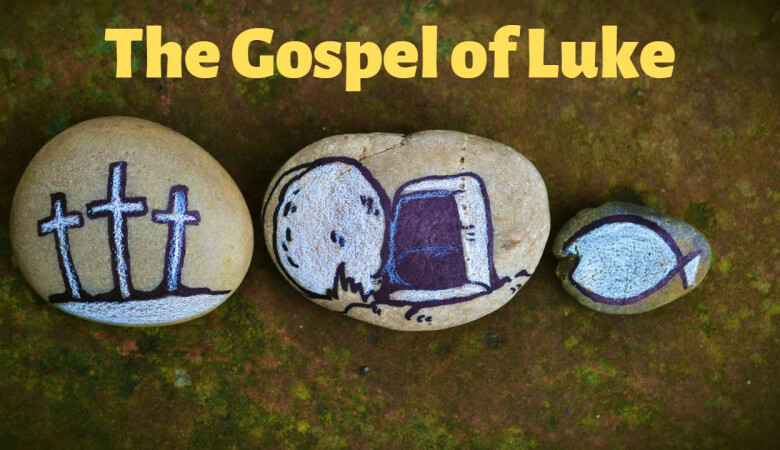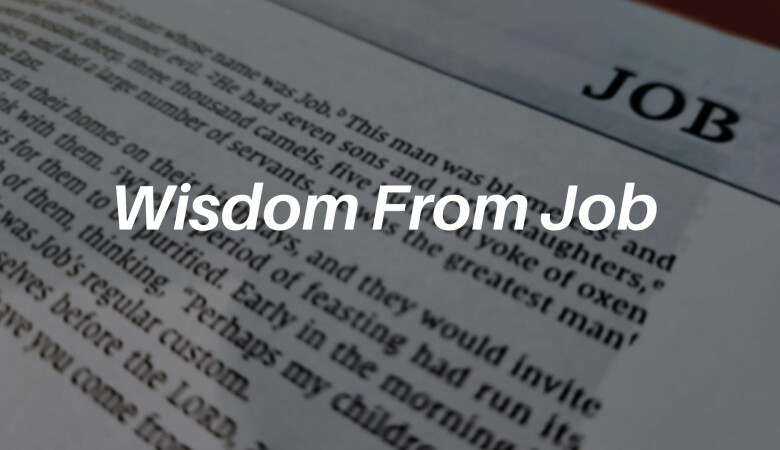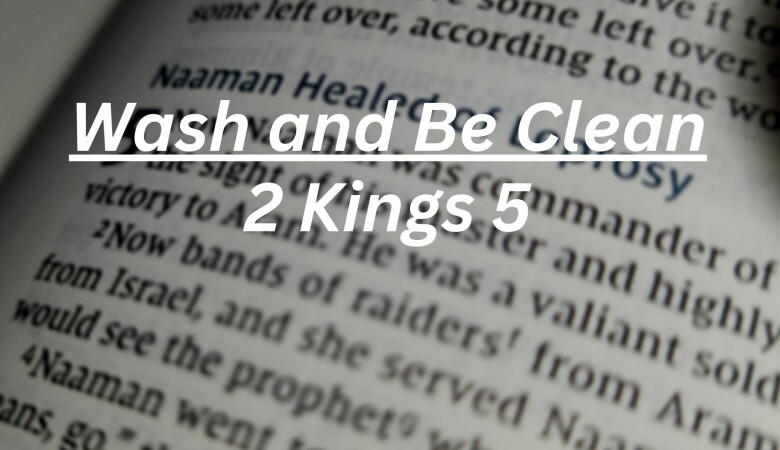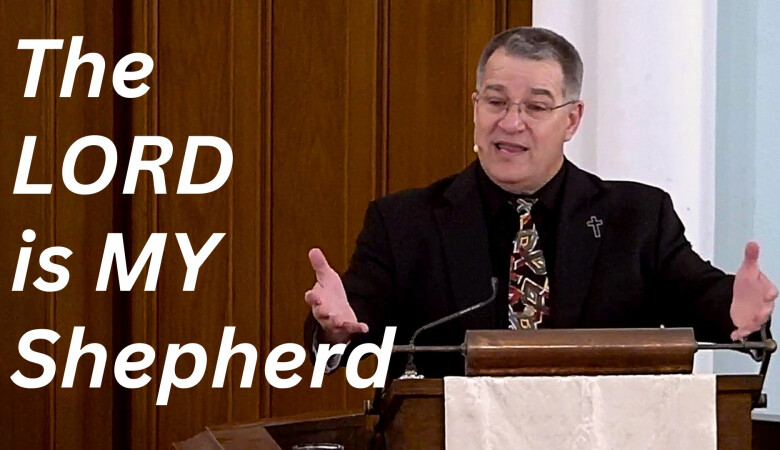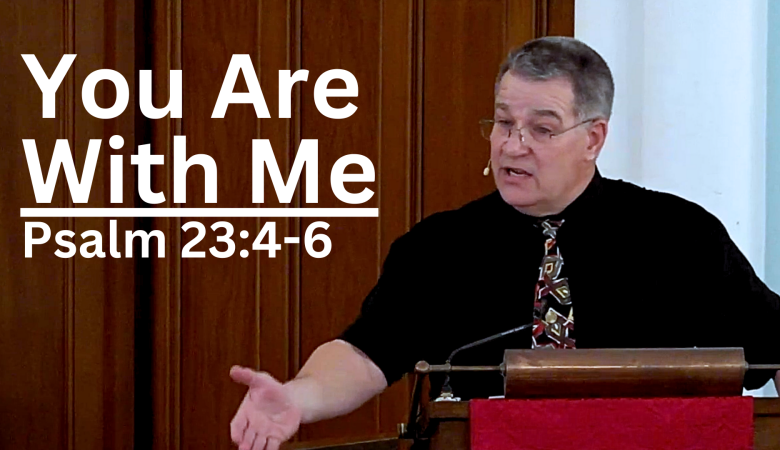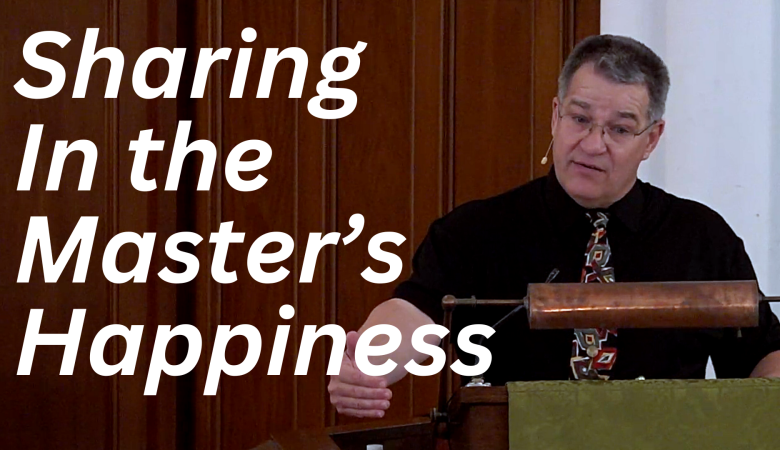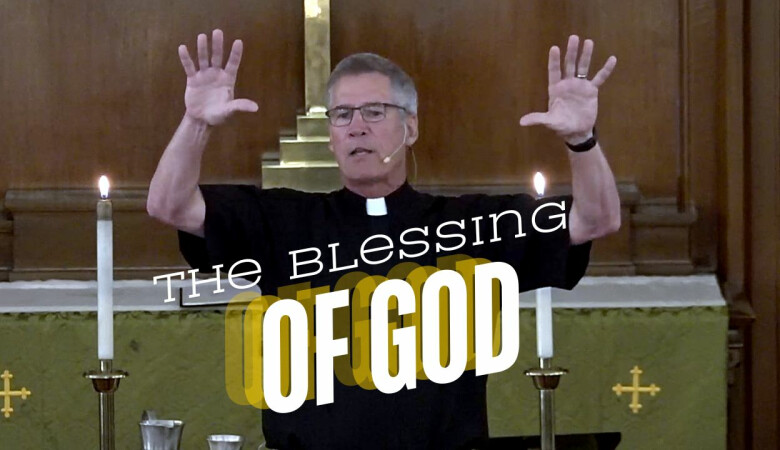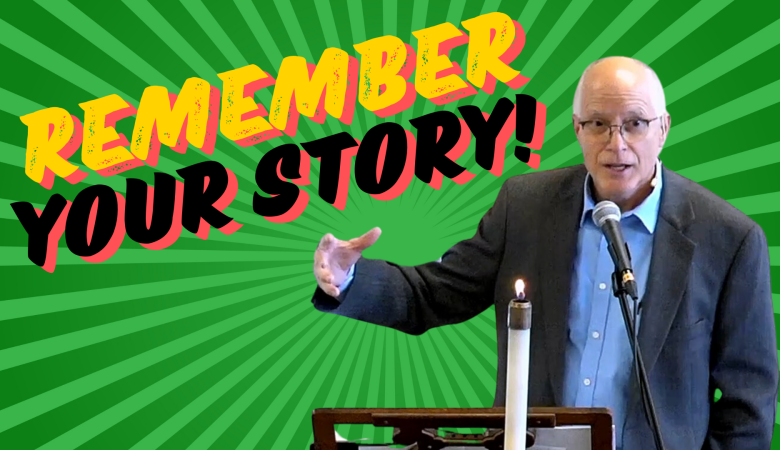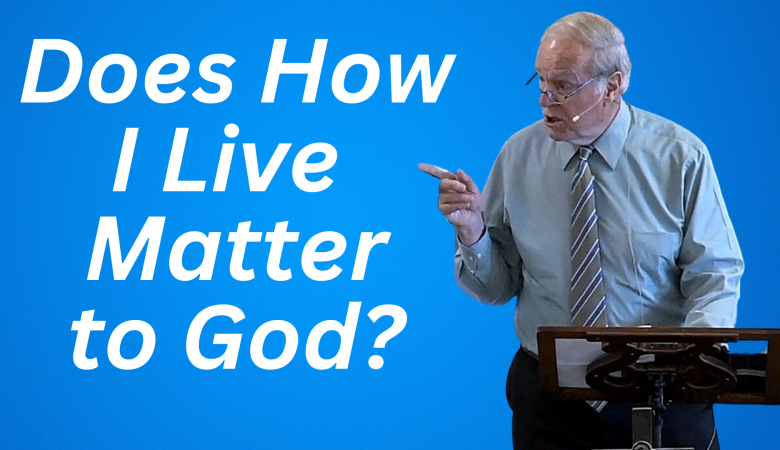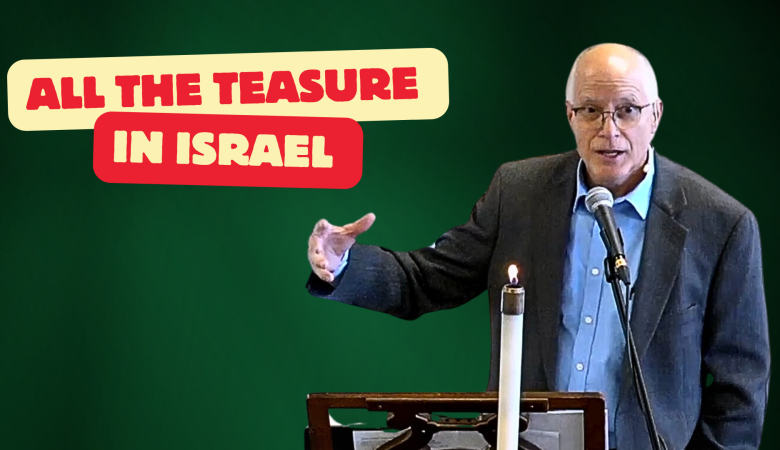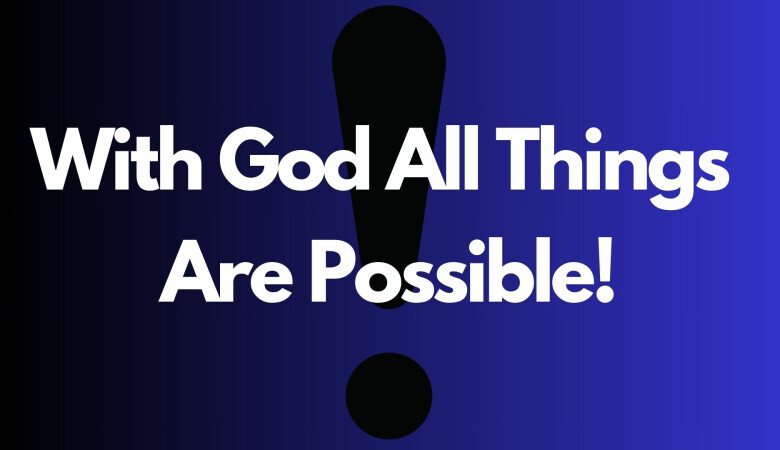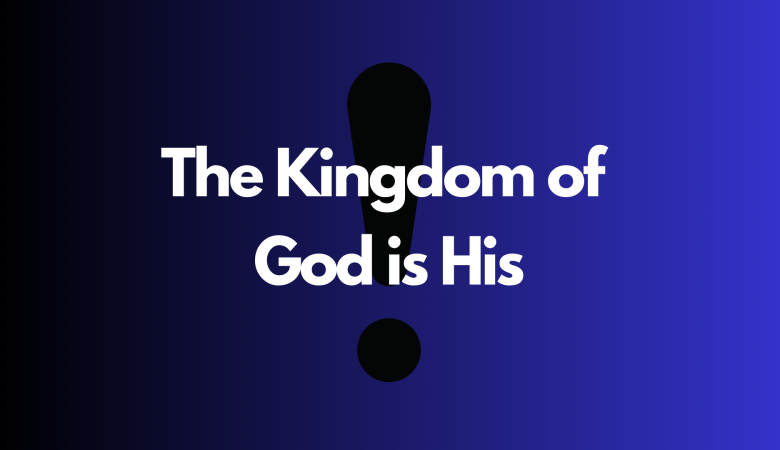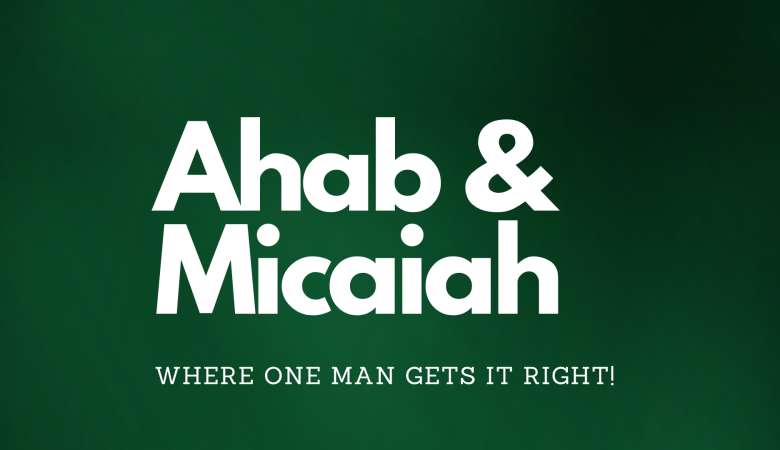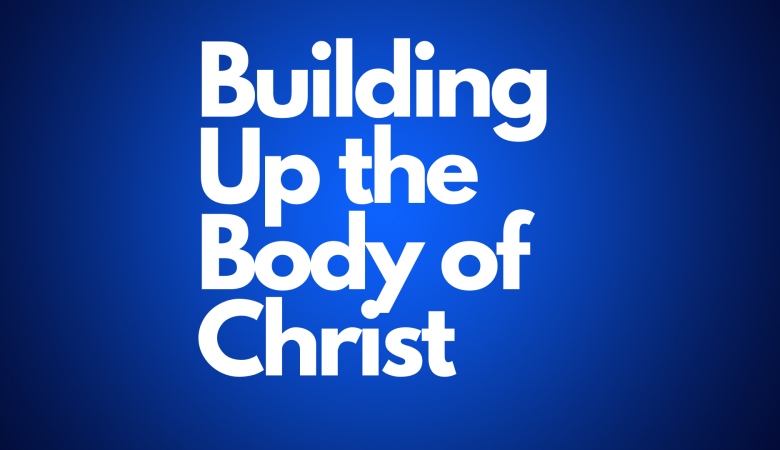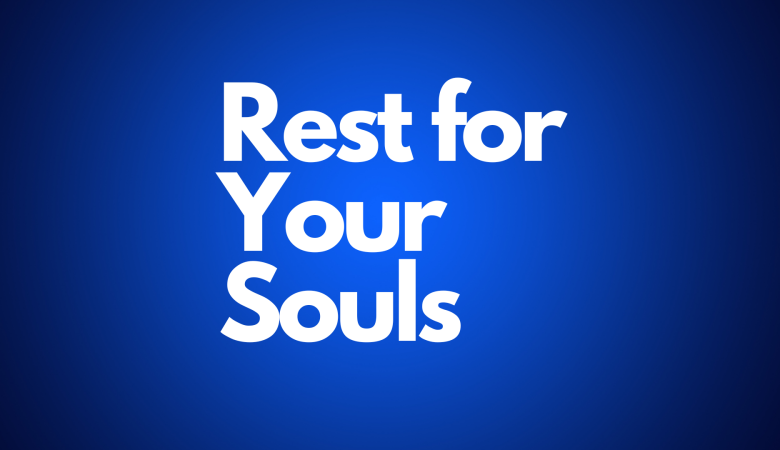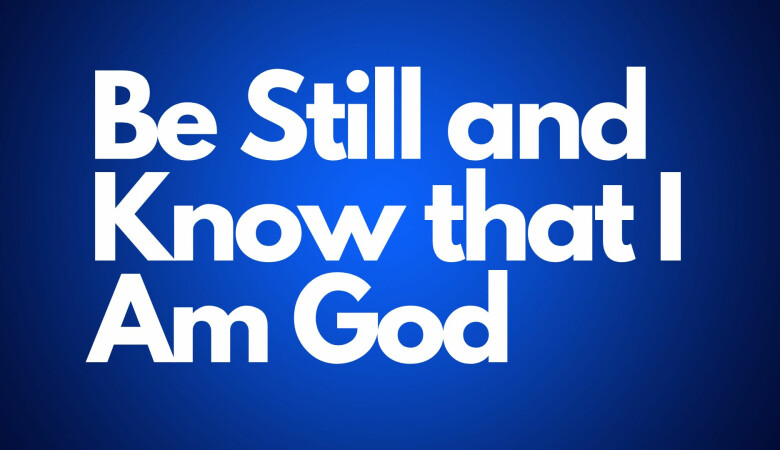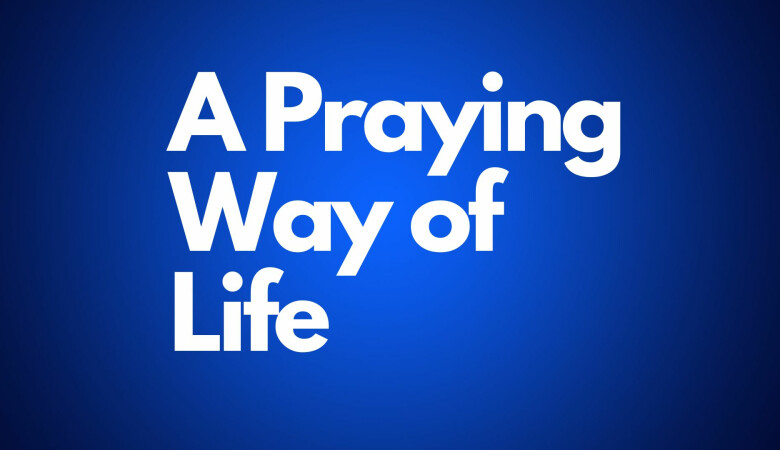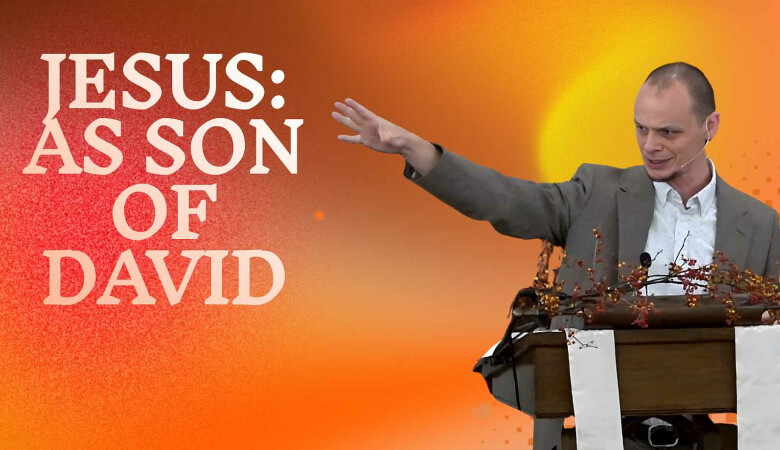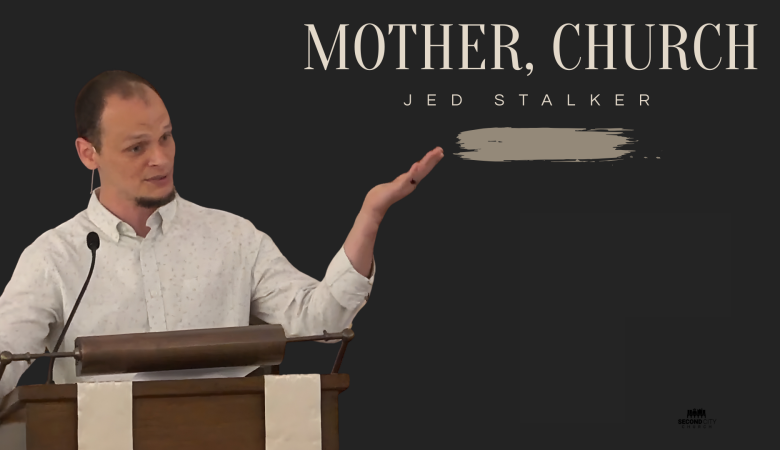Series: Guest Preachers
The Beautiful Answer No
July 28, 2024 | Dale Kulp
Passage: Joshua 5:13-15
ALL SERMONS IN SERIES
Summary
Joshua meets a man with his sword drawn and asks, “Are you for us or for our enemies.” Will you try to help us? Or are you another formidable obstacle we will have to overcome?
The answer he receives is a surprising relief: “No! I am the commander of the army of the Lord. I have come.”
Exhale! Now I can breathe again. All my fears, all my attempts at formulating a plan of attack, can end. I am not alone! I am not in charge of my destiny and my people’s destiny. I stand before the Lord of Heaven and Earth. I can worship… I can sing and shout. I can march with the throng of the people of God and see the salvation of the Lord.
Transcript
Good morning. Several months ago, when, um, Peter asked if I would preach on this date, uh, I was, uh, in my, uh, daily reading, uh, reading this text, and, uh, I was struck with relief by the answer that the commander of the armies of the Lord gave to Joshua. To his question, are you for us or for our enemies? And he said no. And it was like, whoa. It's like just palpable relief. It's wonderful. And I hope that, uh, it will help you today as well. Let's go, uh, to the Lord in prayer as we get started. Thank you, heavenly father, for your word. That is, uh, inspired in every part and written by, uh, holy men who, uh, you spoke through and that you are here with us this morning, uh, by the Holy Spirit's presence among us. Holy spirit, we pray that you will apply your word to our hearts, uh, for our good and for our salvation and for your great glory. In Jesus name, amen. So, uh, many of you know, Shelley and I have, uh, been blessed with seven children, two sons and five daughters. And Daniel, um, has, uh, moved here in December, I guess, has been living here. You're getting to know Daniel. And our older son Samuel, uh, is here with his family, with us this week. What a blessing to have them. Melissa, his wife, uh, Karina and juliana, with us and their little puppy dog, uh, which is a, uh, golden doodle. Uh, stella and, uh, Shelley and I are not dog people. You know, I don't give them any dog illustrations because, you know, that's not really us. But Stella is special, and we've said that, uh, she's really the only dog that's allowed at our house. She's a great little girl, little puppy dog. Um, and, uh, the other day we were getting ready to go out for ice cream, getting the girls in. The cardinal, sam, uh, said, uh, our greatest fear is not that we are inadequate, but that we be left behind because, uh, that is Stella's greatest fear, that she be left behind. He said that, uh, when they're packing to go somewhere, she'll sit in their car for 2 hours as they pack their car because she does not want to be left behind. And, uh, I just thought, you know, actually, being inadequate is a big fear of mine. Uh, my greatest fear is being adequate. Well, I don't know if it's my greatest, but it's a big fear in my life. Maybe it's a fear in your life. I mean, there are a lot of things that you and I have to do that you think you. How am I going to do this? Just preparing a sermon, it's like, how am I going to communicate a clear thought? You know, I can't even hold on to people's names, you know, I can't. There's so many things I can't do. So how am I going to present a clear thought, let alone, uh, a, ah, sermon? That makes sense as a whole and all that. In my job, I'm a flight instructor, teaching people how to fly challenger 300s corporate jets. Now, I've flown corporate jets for years. And, uh, teaching how to fly in a simulator, simulated based training. You'd, uh, think that isn't too bad. But I've spent a good bit of the last year not being sure that I'm really, uh, able, feeling inadequate for this because you have people coming in who have flown this plane for many years, and here, what am I teaching them? And then we have other people coming in who have never flown it. Some people who. It's their first jeth, and it's like, oh my goodness, how am I going to help them be able to fly this? You know, and just maybe you can relate, not in the whole jet thing, but maybe in what you are called to do in your life. It's like, I don't know if I'm really ready to do this. You know, maybe it has to do with, uh, relationships, uh, relationship with your children. Seven children. You know, it's like at, uh, various points in time, it was like, I don't know if I can do this. And maybe just one child. How do I do? How can I bring up this human being, this child? Uh, maybe some of you are in a stuck relationship with a child or with your spouse, or with a brother or sister or with someone. It's like, I don't know how I can do this. Am I adequate for the situation in life in which I am found? Where the Lord has brought me, I made some decisions and here I am. But the Lord brought me here. Am I adequate for what he has called me to do? Here in our text today, we find Joshua meeting with a man with a drawn sword. And, uh, I'm just going to say right at the beginning here, right up front, uh, the obvious, state the obvious. Joshua's name is the same as our Lord's name, Jesus Christ. In the greek old testament, the Septuagint, Joshua is Jesus, Jesus. And Joshua, uh, is pointing us to Jesus Christ just by his name. Just by his name, but also, uh, his activity as well. In our text today, we see Joshua getting to the asking place. He's getting to a meeting place where he's going to ask some questions. And, uh, we see Joshua confronting the man there, and we hear the beautiful answer. No. And we don't usually think of no as a beautiful answer, but I think it is in this case, through the life that he, uh, lived, Joshua was being prepared for this meeting. He was being prepared for everything that he was about to do. Uh, he lived a life together with the people of God. And he lived a life alone with his God. In his life together, he was part of the covenant community, the covenant that God made with Abraham, his great progenitor, Abraham. Uh, Father Abraham. God made a covenant with him that he was going to bless him and bless him with children and bless the whole world through his children, through his offspring. And that he was going to give him a land that he was going to give him the land that he had called him to go from your country and your kindred in your father's house to the land where I show you. And I will make a great nation of you. Bless you. Make your name great, that you will be a, uh, blessing. I will bless those who bless you. In him who dishonors you, I will curse. And in you, all the families on the earth shall be blessed. And this was Joshua's father. This was the father of the people of Israel. He said to, uh, Abraham, I am the Lord who brought you out from ur of the Chaldeans to give you this land to possess. And, uh, Abraham said, well, now, how am I going to know that you are going to give this land to me? Because I don't have any children. And God promised Abraham that he would have a son. Isaac was the child of the promise. And he told Abraham, your children are going to be in captivity for 400 years. They're going to be afflicted for 400 years. But I'm going to bring judgment on the nation that they serve. And afterwards they will come out with great possession. So the Lord brought judgment upon the land of Egypt. We know all about that. The plagues that the Lord brought, uh, on the land of Egypt so that pharaoh would let them go. And they shall come back here to the land where Abraham was in the fourth generation. For the iniquity of the Amorites not yet complete. The iniquity of the Amorites wasn't filled up, but it was being filled up. The 400 years that the children of Israel were in the land of Egypt, we read in our text, uh, psalm, uh, 14. The Lord looks down from heaven on the children of man to see if there are any who understand, who seek God, they have all turned aside. Together. They have become corrupt. They do abominable deeds. And the people in the land of canaan, the amorites, the, um, canaanites, uh, the whole list of all those ites that we have read other places, uh, they were doing abominable deeds. What kind of abominable. You don't even want to imagine the abominable deeds that they were doing. But they were filling up, uh, the cup of wrath of the lord upon them, and it had become full.
So Moses, not Moses, uh, Joshua was part of this community. He had been a servant of Moses. He was a worthy successor to. How would you like to be Moses successor with, uh, pastorates? Uh, uh, you know, if you have a founding pastor that's been out of church for 2025 years, 30 years, 40 years, how would you like to be the next pastor? It's like, no, you want to be the third pastor. The one after the next day, after. Well, Joshua was the next, and he was ready to be the next. He had stood with Moses. He had been Moses servant. He had taken care of Moses personal needs. They helped him in his ministry needs with the congregation. He was trained in obedience by serving Moses. He learned to obey. He learned, uh, to be under command. We have to learn to be under command, to be servants before we can really lead, uh, others. Joshua stood with the twelve tribes of Israel. They had just come across the Jordan river. The lord had dried up the river. They came across the river on dry land, similar to the way the lord had dried up the Red Sea. And I raised a, uh, path through the Red Sea, and Moses led them through there. The lord again dried up the Jordan river. Uh, Moses led. Joshua led them across the Jordan, and they came into the land. And as soon as they got into the land, they were circumcised. The lord told Joshua, uh, circumcise, uh, the nation, because for 40 years they had not been circumcised. All along the way, the ones who, uh, were born in Egypt had been circumcised, but the ones born on the way were not. Why not? Well, you know, we don't know. It doesn't say, but there's a lot of different ideas. Why not? Um, Matthew Henry says they didn't believe God's promise. They refused to trust him and go into the land. The circumcision covenant was tied with the land. And they didn't believe it. They didn't go in. So they were denied the sign and seal of that covenant. That's a pretty good theory, I think. Matthew Henry, uh, had back in like 17 hundreds, uh, the early 17 hundreds. It's amazing. Um, God told Joshua, ah, circumcised them. Now. So here they were on the side of the Jordan where their enemies were the enemies that they were just getting ready to attack, and they're going to be circumcised. That seems like a bad idea. Remember what happened in shechem? Some of you remember what happened in Shechem. That's when, uh, Simeon and Levi were upset about, uh, what the men of Shechem did to Dinah, their sister. And so they persuaded them all to be circumcised. And then they went and attacked them and killed them all. So circumcision is not necessarily a great battle plan. It's not usually what we're doing in preparation, but it's God wants us to obey him so that the glory will be more his. Ah, the more that, uh, he calls us into these things to humble ourselves so that we see, uh, his salvation and that more clearly that it's his salvation. So it was on the 10th day of the first month they came up from the Jordan. They were circumcised immediately. And then on the 14th day, four days after they came out of the river, they celebrated the Passover. So this is all community stuff. They passed through the Jordan, as it were. They were circumcised. Circumcision in the New Testament is clearly tied with baptism. Their baptism is the New Testament version of circumcision. And, uh, then they celebrated the Lord's supper, which, uh, no, they celebrated the Passover, which our Lord has closely tied with the Lord's supper. So they were. Joshua was instructed to lead them through the sacraments. They came through. They were celebrating the sacraments. And then we find, uh, after that, that he comes up to, uh, Jericho. And standing there, uh, would seem alone before the city of Jericho. So I have a couple points, two points of application here, uh, before we, uh, move on to the life alone. One, have you been baptized? Have you been baptized? It's important. It was an important thing for them to be circumcised at that point. Going in baptism is an important thing. Maybe you've come to faith in Christ and have not been baptized. This is the place to do it. Talk to one of the elders. Talk to Peter. Um, a second, uh, point of, uh, application. Uh, Joshua learned obedience serving Moses. Children, are you learning obedience to your parents? Children, we need to obey our parents. We need to teach our children to obey uh, sometimes it seems like that's a hard thing in our culture these, uh, days. Uh, but children need to learn obedience. Children, obey your parents in the lord. For this is right. The apostle Paul tells us. So.
Anyways, Joshua was, uh, in the asking. He came to this, uh, asking place through his life together and through his life alone. Uh, Joshua was alone with the Lord, uh, in the tent of meeting. You might recall the Lord used to speak to Moses face to face as a man speaks to his friend. Uh, Moses used to set up a tent outside the camp. And Moses would go out to the tent of meeting. And the glory of the Lord would come down on that tent of meeting. Remember, uh, there was a cloud. It was a pillar of fire by night. And a pillar of cloud by the day. And when they camped, it would come, and it would settle on the tent of meeting. And Moses would go into the tent of meeting. And Joshua went in with him. Joshua went in. And when Moses would come out of the tent of meeting. To tell the people of Israel what the Lord had to say to them, Joshua remained in the tent of meeting. It's an amazing thing. Think about him staying there alone in the tent of meeting with the Lord. And, uh, he was learning many things, I'm sure, in obedience to the Lord in that way. He stood alone before the Lord in the tent of meeting. Think of Joshua going with Caleb. In a sense, Joshua and Caleb were alone among the spies. And bringing a good report back. When they first come, this was 40 years before they went. And twelve spies went into the land. And ten of them came back with a terrible report. And Joshua and Caleb said, no, don't listen to that report. We can do this. The Lord is with us. Their protection is taken away from them. The Lord will deliver them into our hands. And then all the congregation wanted the stone, Caleb and Joshua. But the glory of the Lord appeared in the tent of meeting. And the people were not able to stone Joshua and Caleb. So he stood alone with, uh, Caleb in, uh, giving the good report to go into the land. We see Joshua getting to the place of asking, the meeting place. And we see Joshua confronting the man that he meets with. Meets with there. Joshua went, uh, to it, uh, there. And he met a man with his sword drawn in his hand. It was given Joshua to bear this burden of leading the Old Testament church of God. To leading them into the promised land. There were a lot of elders in the nation of Israel. A lot of elders in the tribes of Israel. If you have read through, uh, the Pentateuch, uh, the books of Moses. You've seen lists of the leaders, no doubt. And, uh, if you want to read one list, you can read numbers. 26. I tell you what, it's great reading, but it's the leaders of every tribe of the tribes of Israel. So many leaders, so many tribes. But it was not their responsibility to be the leader. The leader was Joshua. He was to lead all of the other leaders. And he came up to Jericho, and he was standing there by Jericho. And what was he doing there? Well, it doesn't say what he was doing there. You know, you would think probably, um, trying to figure out, what do I do? Here's this city with a huge wall around it. The wall was significant. There could be. There were houses built on the wall. You know, that's a big wall. And, uh, what do I do now? We came across. We, uh, had the sacraments. Now what? And, um, he lifted his eyes and saw the man standing there, and his identity was hidden from him. Now, this is Joshua who basically lived in the tent of meeting. You would think if he saw the Lord or a man who was the representative of the Lord, that he would recognize him. But his identity was hidden from him. Like on the road to Emmaus when, uh, Jesus, uh, uh, after the resurrection, was walking with the disciples, and he was opening the scripture to them. And, uh, they didn't recognize him until he broke bread with them. Or like the disciples, uh, out in the ship, in the sea. Out in the boat, in the sea. And Jesus came to them walking on the water. And they didn't know who he was until he cried out and said, it's me. So, uh, he did not recognize who he was. His great father, Abraham. You might think of, uh, the theophany that he received. He was sitting by the door of his tent when three men came to tell him that Sarah was going to bear a son about this time next year, uh, and also to tell him that the iniquity of Sodom and Gomorrah was full. And that their, uh, cry had reached up to heaven. And, uh, Abraham recognized that this was the lord and started bargaining with the Lord, you might recall, about saving, uh, the cities if there were a certain number of righteous people in them. Uh, Joshua came m face to face with the army of the commander of the army of the lord. We might call this lord Sabaoth. You think of the, uh, uh, Luther's, uh, hymn, a mighty fortress is our God. Lord Sabaoth. His name. Well, when I was young, when I was a kid, I used to think the lord of the Sabbath. That, uh, he was, uh, the lord of Sabbath. It's like, no, Lord Sabaoth is lord of hosts. I won't go into how that translation happened, but it is. It's the lord of hosts. He came face to face with Lord Sabaoth. Who do we know is Lord Savaoth? That's Jesus Christ.
Um, you can't overestimate the glory of Jesus Christ. You can't overstate the greatness of our Lord Jesus Christ, but you can say wrong things about him. And, uh, I would like to say that he saw Jesus, but I can't say that he saw Jesus because the word of God was not incarnate until the word of God was incarnate in the womb of Mary. Uh, but this was definitely a theophany. It was definitely, uh, uh, you could say it was a Christophany, as you were an image of Christ before Christ came. Uh, in any event, it was Yahweh represented in human form. And some people might say, oh, well, this must have just been a vision. Well, if this was just a vision, it was an opening up of his eyes to reality, kind of like, uh, Elisha and the young man who was his servant at Dotham when the king of Syria. I'm sorry all these hysterical things here, but the king of Syria had come and surrounded Elisha and his servant at Dotham because they were going to arrest him and take him away. And, uh, the young man said, master, what are we going to do? And, uh, Elisha prayed that his eyes would be opened, that he would see reality. And his eyes were open and he saw the chariots of fire surrounding them, protecting them. This is the way it is. Whether, uh, it was someone that everyone else was seeing or, uh, just someone that they saw, it was reality. The reality of the commander of the army of the Lord, uh, being there. May the Lord open our eyes to reality. You know, I think sometimes we can think, I'm all alone here in this relationship, in this family, in this community, in this whatever. I'm all alone here. No, we aren't ever alone, you know. You think, oh, if only the commander of the army of the Lord would be with me. If only he would. What did Jesus say? I will never leave you or forsake you. And I said, yes, but he ascended into heaven. But he said, it's better that I go because I am going to send the Holy Spirit. We have the Holy spirit. It is the spirit of Jesus Christ, the spirit of Lord Sabaoth, the spirit of the commander of the army of the Lord of hosts is with you and me. We are not alone. May the Lord open our eyes that we might see the man who was confronting Joshua present with us. Joshua met this man and immediately asked the wrong question. He said, are you for us or are you for our adversaries? Uh, how do we know this was the wrong question? Because the commander of the army of lords of hosts answered a different question. He answered the question that he should have asked. Uh, Joshua was asking, what are you going to do? Type question. It was, what are you. Are you going to fight for them, or are you going to fight with us? Are you going to try to help us? You know, here we are. I'm looking at this wall. I don't know what to do. I might as well go up and bang my head against this wall, because I don't know what to do here. And, uh, are you going to come try to help us, or are you another formidable adversary, another problem that I have to deal with going forward? And, uh, he says, no, no. You know, this is so not Joshua's war. That's what we're finding out. This is, you know, Joshua was the man to lead them. He was the leader above all the leaders, the chief leader of all leaders. Uh, but it was not Joshua's war. It was not Joshua's promise. The promise given to Abraham was for the people of God. It was for the glory of Goddesse. The people did not belong to him. The enemies were not his enemies. It's the Lord's promise. The Lord's people. The Lord was vindicating his name. The Lord was bringing retribution against those who were his enemies, doing abominable things for so many years. He was going to bring his people into his land, in which his savior was going to come to save the whole world. Joshua didn't really see the real problem, the real enemies, the gods and demons and principalities and powers in the heavenly places. There's another Jesus in the old testament. Anyone remember, uh, another Jesus in the Old Testament? Uh, Joshua the high priest in the book of Zechariah, Joshua the high priest was standing before the Lord, and Satan was standing at the Lord's right hand, and he was accusing Joshua. And Joshua's robes were filthy, dirty. And, uh, the angel of the Lord said, uh, the Lord rebuke you. The Lord rebuke you. Uh, saying to Satan, now, satan is not everywhere. The Lord God is everywhere. God is omnipresent. He's omniscient. He's omnipresent. He's omnipotent all powerful. Satan has none of those things. He's only in one place at one time. He was there, uh, at the Lord's right hand with Joshua the high priest. Could there have possibly been a better place for Satan to be than there at Jericho at that time? I don't think so. I think Satan was there too. I think that the Lord was opening up Joshua's eyes there in front of Jericho to see the spiritual battle. The commander of the Lord of hosts is here. Satan is here. Yes, but the commander of the lords of hosts is here. Satan, uh, is no match for the armies of God. The Lord who has chosen Jerusalem. Uh, the Lord who has chosen Joshua. The Lord who has chosen this land. The Lord is here. We see Joshua confronting the man with the wrong question. Uh, and we hear the beautiful answer. No. No. Are you forest or for adversaries? No. When I read that a couple months ago, it was like, whoosh.
What a relief. Now I can breathe again because I didn't know what to do. What were we going to do? How are we going forward against. Don't forget there are giants still here. How are we going forward against these giants with these strong cities and these high walls? I can breathe again now. All my fears, all my attempts at formulating a plan, a, uh, plan of attack. I can let go of all that. I'm not alone. I'm not in charge of my destiny, in charge of my people's destiny. I can stand before the Lord of heaven and earth, and I can worship. I can worship him. I can sing and I can shout. I can march with the throng of the people of God and see the salvation of the Lord. I can see the long awaited fulfillment of God's promises to the fathers. So what might be the right question? What might the right question have been for him to ask? Maybe, Lord, who are you? Lord, who are you? It's a question to ask. You know, I don't think we ask that question enough. You know, we think, oh, we got God figured out. We know who God is. And on, uh, different things happening in our life, it's always like, Lord, why, Lord, why? Why is this? Or what? How can I what? How often do we stop and say, lord, who are you? What can I learn about you in this situation that I am in? The Lord reveals himself in these difficult situations. When I am weak, then I am strong. The apostle Paul said, for, uh, the Lord's strength is perfected in my weakness. The answer that the commander of the lords of hosts gave to Joshua was an answer of being. It's not, what are you going to do? It was in the answer of being. It was the be verb. Who I am. I am the commander of the Lord of hosts. You might remember Jesus Christ who said before Abraham was, I am. This is the great. I am standing here before him. Are you for us or for our enemies? You, ah, can hear the commander saying, you don't really know who I am, do you? You don't really recognize me. I will reveal myself to you. I will go before you. And I will be behind you too. Brothers and sisters, we need this strong champion in our lives. You know, sometimes I think, we think it, oh, I can handle my life. I can handle everything myself. Uh, no, I don't think we can handle everything ourselves. We need the commander of the army, lord of hosts, in our day to day life. Praise God through the Holy Spirit, we have what we need for the day to day life that we are called to live. We need Emmanuel. We need God with us. And maybe we aren't facing a city, city walls or whatever.
And I wanted to mention the, um, fact, uh, that it's in the election year. I wasn't sure where it was going to fit in the sermon. I'm going to say it right now. It's an election year, and the media would like us to be afraid of, you know, the more afraid we are, the more we'll watch the media and the more money they'll make. And, you know, and, uh, uh, people from the different parties are both saying, well, if it goes this way, it'll be the end of democracy. Oh, if it goes this way, it'll be the end of democracy. I would like to say that, uh, I don't think it's the end of democracy, no matter which way it goes. And, uh, don't live in fear. Don't live in fear. Look to the Lord. Trust the Lord and do, uh, what he leads you to do going forward. God had a right to judge the canaanites for their moral condition, for their evil deeds. God has a right to judge the United States of America right now. Sometimes it seems that we think, oh, well, if this person gets elected, that's God's judgment upon us. Uh, I think that we get the leaders that we deserve as a nation. Uh, we need to look to the Lord, not just for our elections, but for the moral condition of ourselves and of our neighbors, and pray for the moral condition of the people around us. All people are sinners. All are, uh, rightly subject to God's judgment. God's judgment on the Canaanites was an announcement of his moral judgment and his right to judge the world. It was an inbreaking of final judgment. And sometimes we think, well, this is so unlike the New Testament. It's like, I don't think so. Jesus talks about coming, uh, judge, and the whole sheep and the goats and the judgment of the nations. Jesus Christ tells us about in his teaching and in the book of revelation, we see the inbreaking of Jesus Christ coming. Uh, this is a time of clarity. This, uh, time. This is not a model for holy war that we are supposed to go forward with. No. This is what God did at that time, the commander of the army of the Lord leading them in to bring God's judgment in on those people. Uh, not any sort of model for any warfare that is happening now, but it is a, uh, reminder and a notice to the whole world, similar to the flood of Noah, that the Lord is the judge of the earth. Morality matters, our behavior matters. And there will come a day when the Lord will judge the living and the dead. Jesus is coming again. I was, um, contemplating this. A problem with preparing, uh, a sermon for months is you have so many different ideas. And, uh, I told a couple people this morning, you know, if I would be preaching this next week, it would be a completely different sermon because I would rewrite it with the other ideas. But this is what you get today. And, uh, I was talking with, uh, one of our daughters who, uh, was, uh, um, having. We were talking about some difficult issues, uh, and, uh, the application thought came to me, be the commander of the Lord for somebody. And it's like, now, wait a second. Can I say that? It's like, well, the commander of the lord is Jesus Christ. It's God, it's Yahweh. Uh, can you be Yahweh? For we are his hands, we are his feet, we are the body of Christ. And there's a brother or sister who is feeling like Joshua was feeling. When he's looking at that wall and thinking, the only thing I can't think of anything better than to go hit my head on that wall. That's the best thing I can think of. You can be the incarnation of Christ through the Holy Spirit to someone who's feeling that way. Be the commander of the army of the Lord and come and help someone see, no, you're not alone. This isn't just your battle. This isn't even your battle. It's the Lord's battle. It's the Lord's battle that, uh, he's fighting for you in your life going forward. You know, the whole Bible is not something that's morally neutral. You can't just take it or leave it, uh, depending on how you feel about it. The Bible demands a response. Joshua asked the commander, what does my lord say to his servant? When his eyes were finally opened and he saw who it was? He said, what do you have to say to me? And it wasn't at first a plan of battle. It was at first. Take off your shoes. Take off your. The first thing to do, worship. Worship the Lord. This is holy ground. The way forward is through worship, worshiping the lord. Joshua had a long history of obedience. You know, some of us might be thinking, you know, I don't want to approach the Lord. Joshua, he went and he approached that commander. It was very brave. How many times was Joshua told to, uh, be strong and very courageous? He was being strong. He was being courageous. He walked up to that man with a drawn sword. Some of us don't want to go to the lord because we have a pretty good idea what he's going to say to us. Oh, really? Do you know what the lord of the universe is going to say to you in your situation? Maybe not. Maybe he's going to surprise you. Maybe you should come to him anyways. If you've been avoiding coming to him for a long time for something, some reason, give him a try. Be brave. Be courageous. Come to the commander of the army of the lords of hosts and see what he has to say to you. Think of what he said to Nicodemus. "You must be born again." What he said to the rich young ruler, "sell everything you have and follow me," to Samuel in the temple. Came up. Uh, uh. He turned to the lord and he said, speak, lord, for your servant listens. Let's say that today. Speak, lord, for your servant listens. Let's pray.
Blessed Lord, we thank you that you want to speak to us, that, uh, more than we want to hear from you. You want to speak to us. Forgive us for, uh, nothing. Always looking to you and not always wanting to hear what you have to say. Help us, uh, to turn to you and assist us in hearing what you have to say, uh, to us. And, uh, that we would be able and willing to, uh, in the power of your spirit, do what you would have each one of us to do. In Jesus name,
Series Information
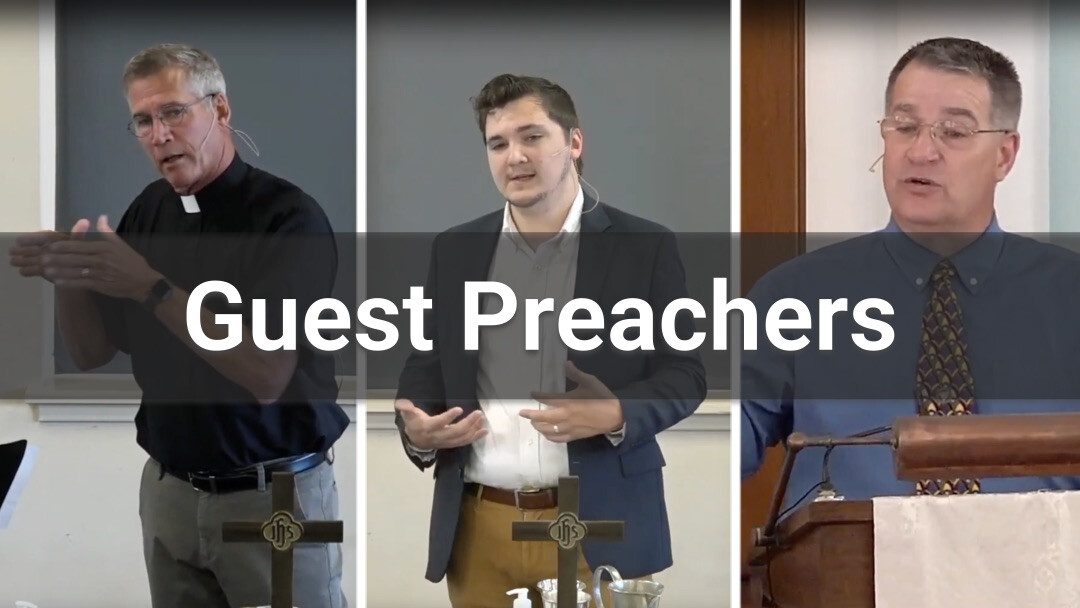
When Pastor Peter is away Second City Church is blessed to hear other men God has gifted to preach.

